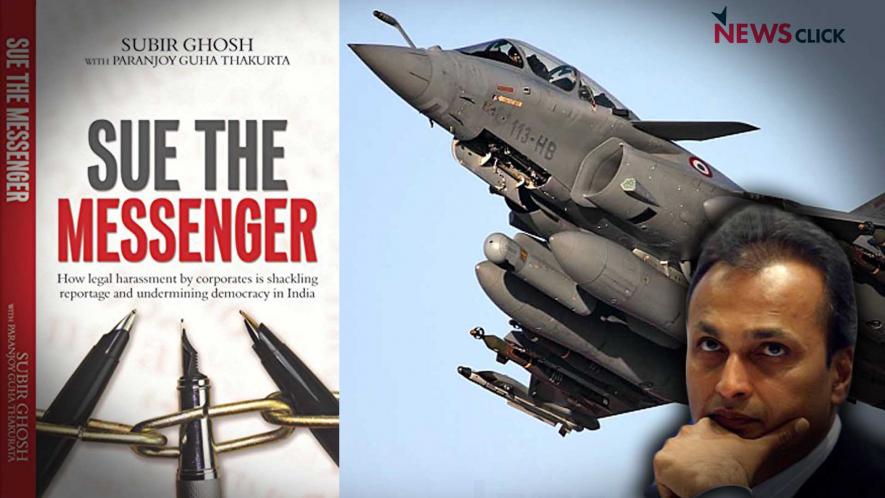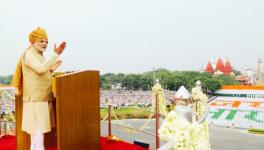SLAPP and Sue to Suppress Public Scrutiny

Newsclick Image by Sumit
Although it is claimed that market thrives on information, and secrecy is considered anathema, fact of the matter is that by and large capitalists thrive on keeping a tight lid on any information which they consider as jeopardizing their pursuit of profit making. They regard criticism or expose of their wheeling-dealing as an attack on their ‘reputation’ and thus debilitating and damaging for conducting their business. By suing or issuing a threat to sue the objective is to intimidate investigative journalists and deter others from publicly stating anything on the matter. So when the Anil Dhirubhai Ambani Group (ADAG) owned Reliance Naval and Engineering Ltd filed a defamation suit demanding Rs 5000 cr from the Congress Party spokesperson in a civil court in Rajula in Amreli district of Gujarat on December 1 they were being true to their type. Albeit, in a first, they were targeting a political party and not a journalist or a media house. The Rajula civil court cited jurisdiction issue to return the suit and ADAG moved the Gujarat High Court on December 8 which fixed 18th December for hearing when a single judge bench issued notice to Abhishek Manu Singhvi, Congress spokesperson to file his reply by December 27th, 2017.
ADAG alleged that the Congress party spokesperson had made “false, defamatory and libelous statements against the Group”. This after the Congress spokesperson was reported saying that three top Gujarat corporate based corporate houses namely ADAG, Adani and Essar groups owed the banks more than Rs 3 lakh crore out of the estimated Rs 8.5 lakh crore owed by 50 Indian corporate houses to banks. He added that one of the Telecom companies (implying Reliance Communications) recently decided to shut their telecom business and that they owed Rs45,000 cr to the banks. And, he asked the Finance Minister Arun Jaitley why instead of declaring some of these debts as Non Performing Assets “you are trying to help the defaulter with further defense contracts like the Rafale deal.”
The term ‘Strategic Lawsuit Against Public Participation’ or SLAPP was coined by two professors of University of Denver, Penelope Canan and George W Pring in 1996 to call attention to cases which get labeled as ‘libel’, or ‘conspiracy’ or ‘business interference’ etc. although they are actually “a new unitary type of litigation” meant to prevent news or information from reaching public domain. Subir Ghosh and Paranjoy Guha Thakurta, in their very important book Sue the Messenger (Authors Upfront & Paranjoy, New Delhi 2016), provide a wealth of information about the use of SLAPP in India after taking us through how it got coined by Professor Canan and Pring and how various media houses and journalists have fared having been served SLAPP over the years resulting in intimidation, harassment, loss of job, or withdrawal of advertisement support to the media house, etc. Some succumb to threat/s, few courageously fight on. Dust has yet to settle down on the unsavory manner in which Sameeksha Trust, of EPW fame, bowed to corporate threat and sacked the editor. And although Bhuj judge recently dismissed Adani’s defamation suit, the Sameksha Trust has not found the courage to rectify their grievous error. Point is that such lawsuits do not always succeed and often the threat backfires. Be that as it may, what we witness now for the first time is a political party being served SLAPP.
ADAG, of course, has a history of filing lawsuits. Ghosh and Thakurta in their book provide information of some of these suits, such as the one filed against Times of India group for a story based on CAG’s draft report on electricity distribution companies in Delhi in August 2015 which refers to Rs 8000 cr of inflated dues. In April 2014 they threatened a suit against Caravan magazine while it was finalizing its expose of close link between Anil Ambani and the then Attorney General Goolam Vahanvati. ADAG incidentally was one of the main beneficiaries of the Telecom scam which Newsclick has covered in some detail. However, the Rafale scam located in the sensitive military sector takes crony capitalism to a dangerous height.
Helping Cronies
Outright purchase of 36 Rafale fighter jets from the Dassault company after cancelling the earlier order for 126 jets in which 108 were to be manufactured in India by HAL under ToT, has been questioned for both price per unit as well as the offset clause which has enabled a heavily indebted corporate house ADAG to become a beneficiary of Rs 21,000 cr offset deal. The manner in which BJP-RSS government went about cancelling the earlier deal and then in the name of “emergency” requirement went in for outright import which benefits an indebted corporate house raises a host of questions and concerns.
The length to which the BJP-RSS government is willing to stoop, to ward off scrutiny of the deal by damning critics or pedaling half truths reveals that they have much to hide. Defenders of the largesse showered by BJP-RSS government on ADAG say that although 36 jets will cost Euro 7.8 billion (Rs 59,000 cr) the higher price is because India is getting state of the art weaponry and other services including maintenance and 75% operability of the fighter jet, which were not covered by the earlier deal for manufacturing in India. Citing different “deliverables” Government and its apologists defend the jump in per unit cost from Rs 764 cr to Rs 1640 cr unit price. In fact, the actual advantage and savings India stood to derive from the earlier deal through Transfer of Technology, and manufacturing by public sector Hindustan Aeronautics Ltd in terms of providing service, maintenance and operability of fighter jets domestically at a far lower cost, were replaced with importing the same from the Dassault at an exorbitant price. In other words propaganda over ‘Make in India’ cannot mask the truth that foreign suppliers retain their stranglehold over India’s military equipment requirement. And now in order that the deal is not probed and questioned, the critics of the deal are being accused of being anti-national and the company has gone ahead to threaten a political party with a defamation suit.
Not unsurprisingly, Government and ADAG are on the same page when they say that the Rs 21,000 cr offset deal negotiated by Dassault with ADAG had nothing to do with the Government and was worked out independently by Dassault.
Sadly, for all those defending ADAG and the RSS-BJP government, none other than Eric Trapper CEO of Dassault which manufactures Rafale fighter jets told Economic Times that his company signed up with Anil Ambani group because “we were told that HAL was fully booked. We talked to Reliance and they were very keen to create such capabilities in India. They have a track record and the financial capabilities as well”. Question is how come Dassault which has more than five decade long association with HAL and until recently was directly negotiating with them regarding Rafale fighter jet, failed to even approach the public sector HAL directly?
Moreover, the Hindu newspaper reported in 2015 that every major aspect of the Rafale deal was entwined in difficulties, including “French side’s concerns about a major Indian private conglomerate whose services are being recommended by some sections of Indian Government”. The newspaper reported that due diligence done on the “recommended” conglomerate has thrown up questions over its financial capabilities.”
The mysterious “conglomerate” was ADAG. On April 10, 2015 the Indian PM announces in Paris cancelling the MMRCA deal negotiated by the previous UPA II government. Anil Ambani’s presence in Paris at the same time, as also his meeting with officials of Dassault together with the Indian PM were also reported. So it is obvious that both Government of India and Dassault are parsimonious with truth. After pushing ADAG as the only private sector conglomerate, all that was required was the tweaking of existing policies. Thus on June 24th 2016, the Modi Government opened up automatic route for FDI of up to 49% in the defense sector requiring no prior approval from the Union Cabinet or the Cabinet Committee on Security. Rafale deal was signed on September 23rd 2016 for purchase of 36 fighter jets valued at Rs 59,000 cr. Ten days later on October 3rd 2016 Dassault and Reliance group set up a joint venture to service 50% offset value of the deal.
So there is much that needs looking into. And far too many questions need answers. The only way to overcome fear and intimidation is to persist with searching questions because a progressive foreign and security policy cannot brook continued dependence on foreign suppliers.
Get the latest reports & analysis with people's perspective on Protests, movements & deep analytical videos, discussions of the current affairs in your Telegram app. Subscribe to NewsClick's Telegram channel & get Real-Time updates on stories, as they get published on our website.
























